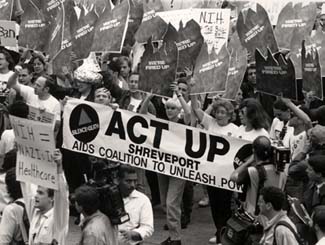 |
|
 |
Documenting Social Change
NIH Seminar Details History of ACT UP |
| By Sarah Schmelling |
| |
 |
 |
 |
| |
ACT UP demonstrators march at NIH in 1990. |
In 2001, Sarah Schulman was driving a rental car in Los Angeles when she heard a radio story recognizing the 20th anniversary of AIDS. "They said, 'At first, America had trouble with people with AIDS, but then they came around,'" Schulman explained in an NIH History of Medicine seminar. "And I just knew I could not continue my life without making sure that no one would ever say something like that again."
The words hit her because, as a writer and activist long involved with the AIDS Coalition to Unleash Power, or ACT UP, she had memories of "all of my good friends, and all of the thousands of people
who spent their lives-some of them to their deaths-forcing this country to change its policies toward AIDS and people
with AIDS," she said. "And to have that naturalized, as though the dominant ulture was so enlightened they just happened to 'get it' one day, we just couldn't let that happen."
more…
|
|
|
|
|
|
 |

